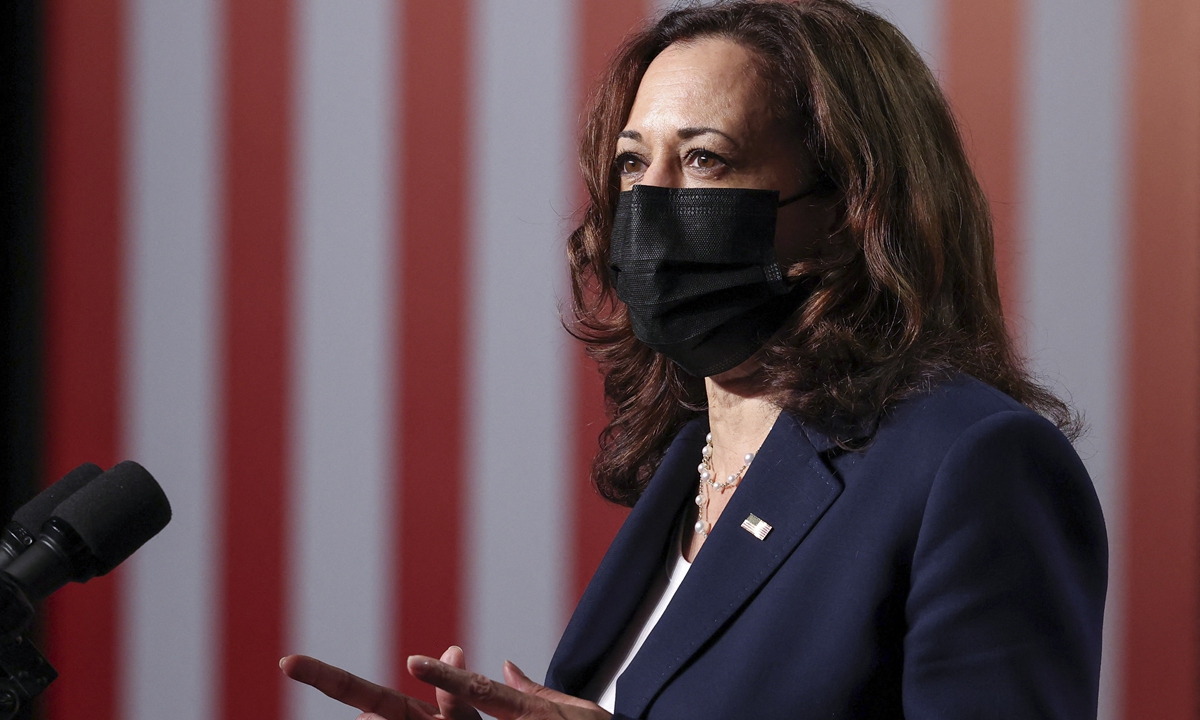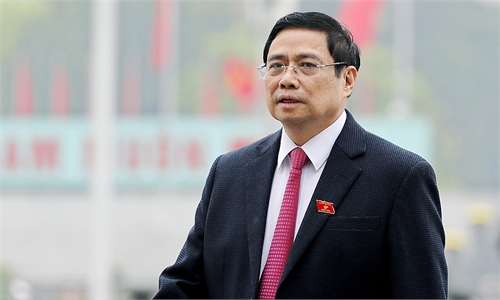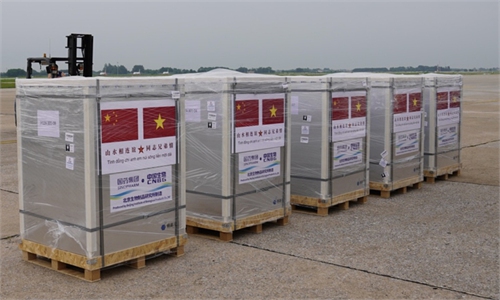
US Vice President Kamala Harris delivers remarks during the official launch of the CDC Southeast Asia Regional Office in Hanoi on August 25, 2021. Photo:AFP
US Vice President Kamala Harris, while meeting Vietnamese President Nguyen Xuan Phuc on Wednesday, accused China of bullying in the South China Sea, the second time in two days that she had attacked Beijing during her visit to Singapore and Vietnam.
In a land that witnessed the "Saigon moment" in 1975, Harris, the first US vice president to visit Vietnam, talked up the "China threat" and the US commitment to its allies, even as the US is experiencing a debacle in Afghanistan withdrawal, a scene all too familiar to Vietnam.
Experts say the current neutrality of Singapore and Vietnam shows both countries are wary of Harris' visit and the role of the US in the region. Harris' lobbying, amid the US' abandonment of its Afghan allies, also shows the decline of US domination and its increasing desire to sow discord in the Asia-Pacific, they said.
During her visit, Harris also embraced elevating the relationship with Vietnam from a comprehensive partnership to a strategic partnership. She also expressed support for offering COVID-19 vaccines and a Coast Guard cutter to Vietnam, to help defend its security interests in the South China Sea, AP reported.
Harris' remarks came after Vietnamese Prime Minister Pham Minh Chinh said that developing Vietnam-China relations is a strategic choice and a top priority of Vietnam's foreign policy, during his meeting with Chinese Ambassador to Vietnam Xiong Bo on Tuesday.
Chinh stressed during the meeting with Ambassador Xiong the importance of the communication between Vietnam and China, noting that the two countries will deepen inter-Party, foreign affairs, national defense, and public security cooperation, and guard against the "peaceful evolution" of hostile forces and attempts to sow discord between the two countries, according to the Chinese Embassy in Vietnam.
Harris' visit, at the wrong time and to the wrong target, can only have a negative effect, Li Haidong, a professor at the Institute of International Relations of the China Foreign Affairs University, told the Global Times on Wednesday.
Although Harris' Asia tour was determined before the US' fiasco in Afghan, which showed people the tragedy of being a partner of Washington, it once again showed how keen the US is to create divisive rivalries in the Asia-Pacific, said Li.
Unlike the equality and mutual benefit advocated by China, the essence of US diplomacy is to make allies sacrifice for the US, not the other way around. Singapore and Vietnam are clear about that, Li said.
Harris' tour also came on the heels of PLA's vaccine aid to Vietnamese military on Monday. Chinh expressed Vietnam's gratitude to China, emphasizing that Vietnam opposes politicizing either the pandemic or the virus origins-tracing issue.
Both Harris' visit and that of US Secretary of Defense Lloyd Austin in July were made at the invitation of Vietnam, which sparked suspicion that Hanoi is leaning toward Washington, given the dispute between China and Vietnam over the South China Sea.
The Vietnamese do not want China-Vietnam relations to be damaged by advancing ties with US, although Vietnam also needs to draw the US to its interests in the South China Sea, Zhuang Guotu, head of Xiamen University's Southeast Asian Studies Center, told the Global Times on Wednesday.
"The meeting between Chinh and Xiong showed that China-Vietnam relations are stable… despite Vietnam being one of the countries most likely to be wooed by the US in the Asia-Pacific," said Zhuang.
"Hanoi is clear about its special relationship with Beijing (socialism system and neighboring countries) and cannot give up its economic and trade ties with China," Chen Xiangmiao, an assistant research fellow at the National Institute for South China Sea Studies, told the Global Times on Wednesday.
In 2020, China-Vietnam trade reached $192.28 billion, up 18.7 percent year-on-year. China's exports to Vietnam reached $113.81 billion and its imports from Vietnam reached $78.47 billion, year-on-year growth of 16.3 percent and 22.4 percent, respectively, data from the Ministry of Commerce showed.
Despite the desire of the US and Vietnam to promote security cooperation, Vietnam will take a pragmatic approach, stressing the importance of relations with China and the ruling position of the Communist Party of Vietnam as its primary interest, Chen said.
Analysts said it is pathetic that the US is showing its commitment to Asian partners after the fiasco in Afghanistan. Such painful memories are likely to deepen: At the height of the epidemic in Vietnam, Harris did not bring vaccines shots like China did, but only lip service or perhaps an exchange of interests at most.
Since Southeast Asian countries are close to China geographically, the US may ask them to provide information to promote the accountability of the virus origins in China, tarnish China's reputation and increase China's diplomatic costs, Chen said.
The US may also continue to hype the absurd idea that Chinese vaccines are ineffective and engage in vaccine diplomacy by offering vaccines to Asia-Pacific countries in exchange for negative views on Chinese vaccines, Chen said. "This is alarming."



